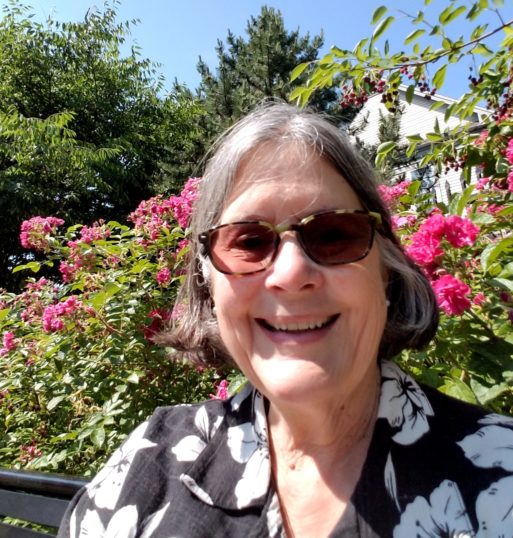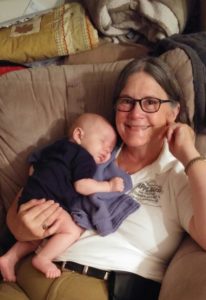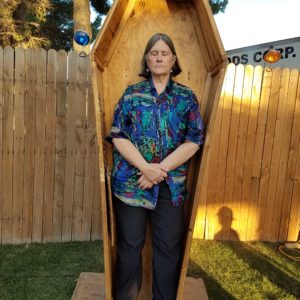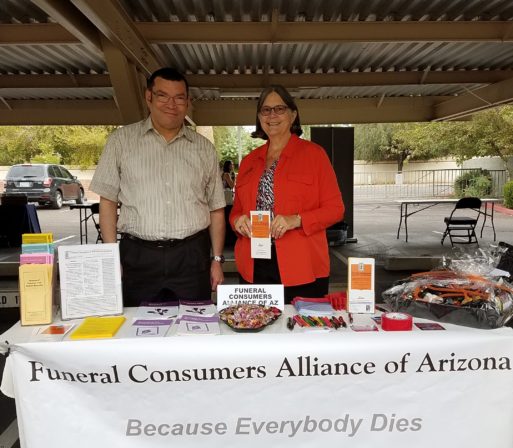 Today SevenPonds speaks with Ruth Bennett, the Executive Director of the Funeral Consumers Alliance (FCA) of Arizona. A nationwide organization, the FCA is a nonprofit that works to protect the rights of consumers to choose a “meaningful, dignified, affordable funeral.” Ruth has been with the FCA since 2010. She has agreed to speak with us today to discuss “pre-need” plans and the various ways in which consumers can preplan for their own funerals or those of their loved ones.
Today SevenPonds speaks with Ruth Bennett, the Executive Director of the Funeral Consumers Alliance (FCA) of Arizona. A nationwide organization, the FCA is a nonprofit that works to protect the rights of consumers to choose a “meaningful, dignified, affordable funeral.” Ruth has been with the FCA since 2010. She has agreed to speak with us today to discuss “pre-need” plans and the various ways in which consumers can preplan for their own funerals or those of their loved ones.
Editor’s Note: This interview has been edited for length and readability.
Kathleen Clohessy: So, it seems that insurance policies are probably not the best way to pay for your final expenses. What else would you recommend?
Ruth Bennett: Well, there’s one more type of pre-need plan, and it is actually the least complicated. It’s called a payable-on-death or POD account. Unfortunately, the larger banks such as Chase and Wells Fargo rarely know much about these because they don’t really like dealing with smaller accounts. Credit unions and smaller local banks are more likely to know what a POD account is and be willing to work with customers to open one.
Kathleen: What is it, exactly?
Ruth: Essentially, a payable-on-death account is an irrevocable account set up with one or more named beneficiaries. (I believe in putting more than one on the account.) You can pay into it over a period of time — if you can only afford $10 a month then that’s all you need to put into it. Or you can pay it all at once. Unlike an insurance policy, where you get charged extra interest if you fail to pay the entire balance within a year, there’s no penalty for gradually funding a POD account.
Kathleen: Is there a downside to this approach?
Ruth: Yes, there are two. The first is that the funds in a payable-on-death account will count against your Medicaid assets limit even though it’s an irrevocable account. So if the owner of the account has to go into a nursing home, they may not be eligible for Medicaid if there is too much money in the account.
 The second is that the money isn’t released for a week or 10 days after a person dies. That’s because you need a death certificate to access the funds, and that’s how long it takes to get one in most states. But in most instances, this isn’t a huge hurdle — someone in the family usually can use a credit card to pay for the burial or cremation and then be reimbursed when the money is available. But if no one has cash on hand or a credit card, that can be a deal breaker. Funeral homes generally insist on being paid before they bury or cremate someone because they’ve found out that families are not as incentivized to pay after the fact.
The second is that the money isn’t released for a week or 10 days after a person dies. That’s because you need a death certificate to access the funds, and that’s how long it takes to get one in most states. But in most instances, this isn’t a huge hurdle — someone in the family usually can use a credit card to pay for the burial or cremation and then be reimbursed when the money is available. But if no one has cash on hand or a credit card, that can be a deal breaker. Funeral homes generally insist on being paid before they bury or cremate someone because they’ve found out that families are not as incentivized to pay after the fact.
I saw this when I was involved with the People’s Memorial in Seattle. We had opened our own funeral home and some of the funeral directors were extending credit. But we soon learned that people were pretty slow to pay once the service was over and the body was cremated or in the ground. We lost about $8,000 in the first few months, then had to turn a bunch of accounts over to collections, which seemed like a pretty nasty thing to do. But if you can’t pay your bills, you can’t stay in business very long. So we quickly stopped extending credit after that.
Kathleen: What options are there, then, for people who don’t have the cash to pay for final expenses?
Ruth: There are some companies that will make loans to people for funeral expenses. But this is rarely a good option unless the family is truly destitute. You just don’t need to spend $12,000 on a funeral and burial if you can’t afford it, even if that’s what the person who died wanted. Quite frankly, if someone wanted an elaborate burial they should have thought of some way to make it happen. It’s not up to the family to go into debt when they can choose a $600 cremation instead. Plus, I’ve had hundreds of conversations with seniors, and not one has ever said: “I want a big, fancy funeral whether it bankrupts my family or not.” To a person, they say, “Just cremate me or bury me in a plain pine box … Just do it the cheapest and easiest way. I don’t want my family to be hurt by this.”
Kathleen: Are there any other strategies you know of for people to pre-pay their final expenses?
Ruth: Yes, actually, there is one that’s so simple most people don’t even think about it. Just have enough money in your bank account to pay for your own funeral or cremation.
I had a fellow call me a few months ago whose dad was in hospice. He had been speaking to a funeral director to make arrangements and said the funeral director was trying to get him to buy a pre-need plan. I asked him if his dad had any money in his checking account and he said, “Yes, he has a couple of thousand dollars.” “Does he want to be buried or cremated?” I asked. “Cremated,” the man said. So I asked him why he wanted to hand over money for a pre-need plan when he had enough money in the bank to pay cash? It’s crazy.
Kathleen: I would assume that someone would need to be on the account with the person who is dying? In other words, it needs to be a joint account?
Ruth: Yes. Or the family can discuss it beforehand, and Dad can just give his son a check for $600 or $800 to pay for his cremation. Obviously, there has to be a certain amount of trust there, but there’s generally no reason not to do that.
Kathleen: So your advice to people who have the cash on hand to pay for their final expenses is to avoid pre-need plans altogether?
Ruth: Of course! Why would someone who is 90 years old open a pre-need account or take out an insurance policy when they have the cash available to pay for what they want? I just advise them to make sure they add another person they trust as a signatory on their accounts so that person can access the funds quickly after they die.
Kathleen: I’ve heard some people say that, even if the money is available, it’s so much easier for the family if the person has made arrangements before they die.
Ruth: Yes, of course, it is. But you can make these arrangements ahead of time without paying for them in advance. And really, there’s no good reason to get involved with a funeral home at all. Many funeral directors work on commission, so when an elderly person comes in wanting to talk about final arrangements, it’s a golden opportunity to upsell all kinds of items that the person neither needs nor wants. Sometimes, for example, a funeral home will have a selection of very affordable caskets, but they’re hidden away in the basement where no one sees them unless they ask. And most folks don’t ask.
You also have the right, by law, to be buried in a casket that you buy yourself. And these days there are a lot of places like Walmart.com and Costco.com where you can buy an affordable casket online. And their prices are really pretty good. In fact, when I lived in Seattle, Costco had an endcap of one of the aisles that they called the “casket corner.” You could just choose the one you wanted and fill out a little form, and they delivered it to the funeral home the next day.
Kathleen: And why not, right? We buy everything else at big box stores these days!
 Ruth: Well, a lot of people still think that doing it yourself is somehow contrary to “traditional” values. But really, a “traditional” funeral was the womenfolk washing and dressing the body, and the menfolk going out to the barn and building a casket, and then laying the person out on some sawhorses in the parlor and inviting all the neighbors over to say goodbye. Then they would carry the person out to the back 40 and bury them. That was a traditional funeral right up until the early part of the 20th century.
Ruth: Well, a lot of people still think that doing it yourself is somehow contrary to “traditional” values. But really, a “traditional” funeral was the womenfolk washing and dressing the body, and the menfolk going out to the barn and building a casket, and then laying the person out on some sawhorses in the parlor and inviting all the neighbors over to say goodbye. Then they would carry the person out to the back 40 and bury them. That was a traditional funeral right up until the early part of the 20th century.
Kathleen: So true! So, just to recap for a moment …What are some circumstances when a pre-need plan might make sense?
Ruth: Well, in some cases for some families, buying an insurance policy is a practical choice. For instance, let’s say your mom or dad has to go into an assisted living facility and will have little or no assets when they die. Then it makes sense to buy an inexpensive insurance policy for, say $1,000, just enough to cover the cost of cremation and death certificates. Most funeral homes will lock in a price if you buy a policy. So if you buy an insurance policy for $850 and the current cost of cremation is $700, they will guarantee the $700 price.
That said, for most people, it’s just not necessary. Here in Arizona, our member price for cremation is $395. So you put $55 in taxes on top of that and $50 for five death certificates, and you’re at $500. And honestly, there are very few families that can’t scrape together $500. Obviously, there are some. But they can go to the public fiduciary or the county coroner and have it paid for they are truly indigent. Though there aren’t always a lot of funds available for that.

Ruth Bennet with former FCA board member Tony Lee
Kathleen: What role does the FCA play in all this? For example, what do you do to help your members avoid these pitfalls and plan a funeral they can afford?
Ruth: We do quite a bit. When a person first signs up as a member, we send them a “new member letter” that goes over in detail what to do when a death occurs (which will be different depending on whether it’s an expected or unexpected death). We also send out a vital statistics record that lists all the information the family will need for a death certificate in Arizona. It makes things so much easier on the family at the time of death if they don’t have to search for dad’s military history or mom’s middle name. So we encourage all of our members to fill this form out and distribute copies to as many people as possible. We also ask them to send us a copy, which we file away in a secure space. When we’re notified that the person has died, we fax our copy over to the funeral home.
We also used to sell a freezer pack, I’m not sure if we still do. It’s a nice, heavy-duty plastic container to put your important papers in. The refrigerator is one of the few places in the home that won’t burn if there’s a fire. So, we advise people to keep their important papers in the freezer where they will be safe.
In most locations, the FCA also provides an online price comparison survey that both members and nonmembers have access to. This is a great way to comparison shop without necessarily having to contact a lot of funeral homes. The exact prices may not always be up to date, but it’s a good bet that if funeral home “A” was more expensive than funeral home “B” two years ago it will still be more expensive today.
Kathleen: Thank you for all of this information, Ruth. It was very enlightening. And I’m sure our readers will find it extremely helpful!
Ruth: You’re welcome!
This concludes part two of our interview with FCA of Arizona executive director Ruth Bennett. If you missed part one, please catch up here.

 What Are the Best Ways to Pay for Final Expenses?
What Are the Best Ways to Pay for Final Expenses?


 First the Wealth Gap, Now the U.S. Has a Growing Health Gap
First the Wealth Gap, Now the U.S. Has a Growing Health Gap

 Our Annual Seven Holiday Gifts for Someone Who Is Grieving, 2024 Edition
Our Annual Seven Holiday Gifts for Someone Who Is Grieving, 2024 Edition














